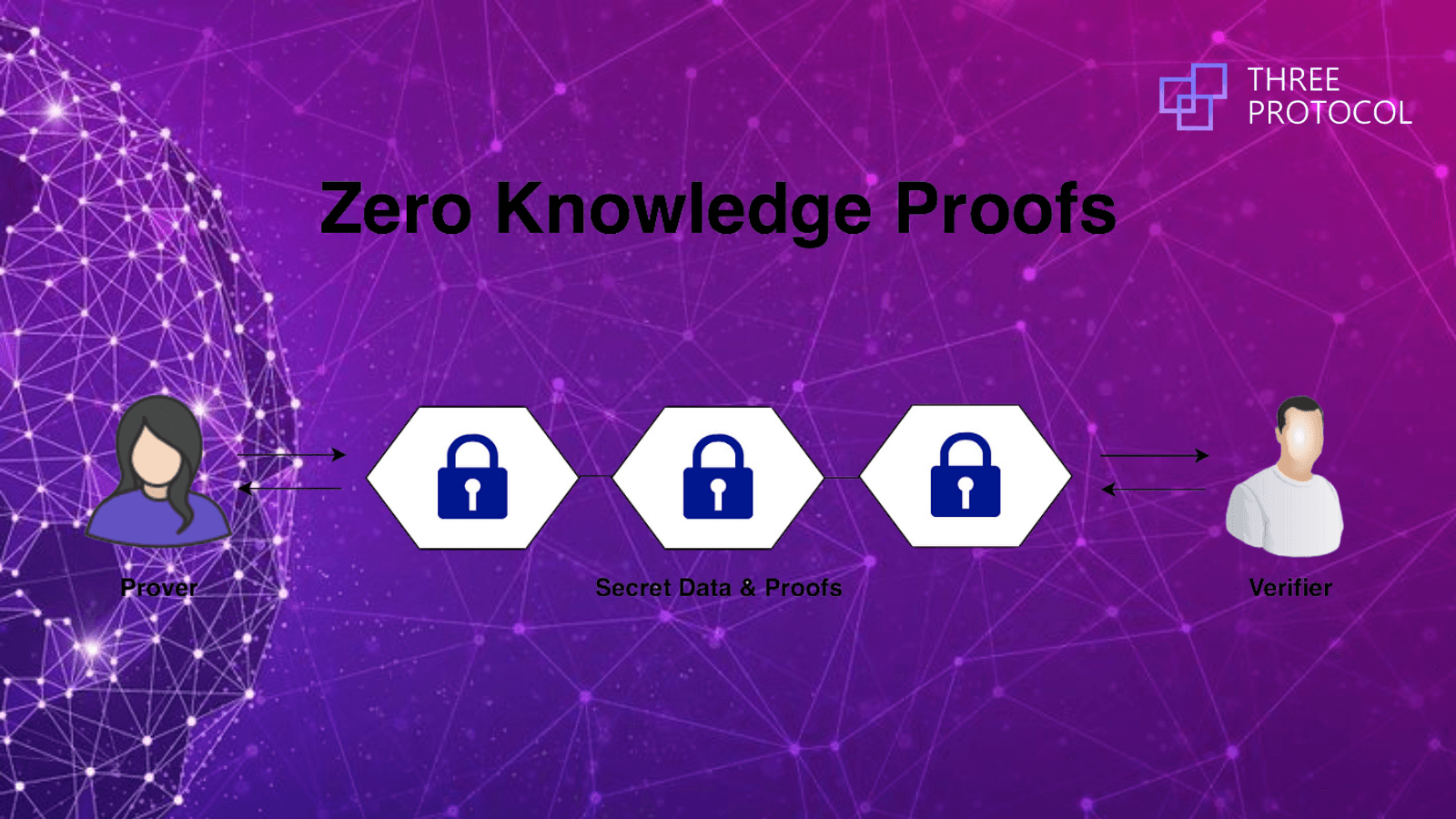Enhancing Digital Privacy and Security: The Role of Zero-Knowledge Proofs in Three Protocol
Introduction
In the ever-evolving digital landscape, privacy and security have become critical issues. With cyber attacks on the rise and increasing concerns about data breaches, the need for secure, anonymous transactions is more pressing than ever. This is where Zero-Knowledge Proofs (ZKPs) come into play. Leveraging advanced cryptographic techniques, ZKPs enable a paradigm shift in how we approach privacy in the digital world. At the forefront of this revolution is Three Protocol, a project that integrates ZKPs to create secure, efficient, and decentralized marketplaces. This article delves into how Three Protocol effectively employs ZKPs to offer ultimate privacy and security in digital interactions, addressing critical issues such as cyber threats and data leaks.
Understanding Zero-Knowledge Proofs (ZKPs)
Zero-Knowledge Proofs (ZKPs) are a sophisticated cryptographic method that allows one party (the prover) to demonstrate to another party (the verifier) that a statement is true without revealing any information beyond the statement’s validity. It's akin to proving that you know a secret without ever disclosing the secret itself. This revolutionary technology has vast implications for enhancing privacy and security in digital transactions.
How ZKPs Work
ZKPs involve a mathematical challenge-response protocol where the prover convinces the verifier of a fact without exposing any additional information. For instance, in Three Protocol, ZKPs allow users to verify their identities or transaction details without revealing the underlying data. This process ensures that sensitive information remains confidential, significantly boosting privacy and security.
The Growing Threat of Cyber Attacks
Cyber attacks are becoming increasingly frequent and sophisticated. A case in point is the recent $8M Wallet drain attack on Bitsensor, attributed to a private key leakage. This incident highlights the vulnerabilities associated with storing sensitive information like private keys. The traditional approach to securing digital identities is proving to be inadequate in the face of evolving cyber threats. This is where Three Protocol’s innovative use of ZKPs makes a significant difference.
Real-World Implications
Imagine the peace of mind knowing your digital transactions and identities are secured by a system that never exposes your private information. In the current climate of escalating cyber threats, this level of security is not just beneficial; it's essential. Three Protocol’s integration of ZKPs provides this robust security framework, ensuring that your digital interactions are protected from unauthorized access and breaches.
How Three Protocol Utilizes Zero-Knowledge Proofs
Three Protocol leverages ZKP-Stark technologies to create No-KYC (Know Your Customer) digital IDs, ensuring that no sensitive information is ever stored or exposed. Here’s a closer look at how ZKPs function within Three Protocol:
User Anonymity
When a user creates a profile on a marketplace powered by Three Protocol, they generate a cryptographic hash of their private key. This hash serves as their pseudonymous identity on the blockchain, functioning much like a unique barcode that represents the user without revealing their actual identity. This process ensures that users can participate in the marketplace anonymously and securely, without the risk of identity theft or data breaches.
Actionable Tip: Ensure your privacy by using platforms like Three Protocol that offer ZKP-based anonymity features, protecting your identity in all digital interactions.
Transaction Privacy
ZKPs allow users to prove that they have the necessary funds or credentials without disclosing their wallet's contents or transaction history. This is akin to presenting an item at a bar that confirms your age without revealing your actual ID, thus preserving your privacy. This feature is crucial for maintaining discretion in financial transactions and mitigating the risk of data exposure.
Actionable Tip: Utilize ZKP-based platforms for your financial transactions to maintain privacy and protect sensitive financial data from exposure.
Full Control for Users
One of the standout features of Three Protocol is the autonomy it grants users. Individuals have the freedom to choose what information they wish to display on marketplaces, such as ratings or endorsements. This selective disclosure ensures that users retain control over their data and personal information, reinforcing the principles of self-custodianship and decentralization.
Actionable Tip: Take control of your digital identity by selectively disclosing information on platforms that support ZKPs, ensuring your data is only shared when and where you choose.
The Benefits of Zero-Knowledge Proofs on Three Protocol
The integration of ZKPs within Three Protocol offers multiple significant advantages:
Enhanced Privacy
ZKPs ensure that user identities and transaction histories remain private, bolstering trust and security on decentralized platforms.
Verifiable On-Chain Profiles
Users can build verifiable profiles on the blockchain without compromising their anonymity. This is particularly beneficial for establishing credibility in digital marketplaces.
Inclusivity for Unbanked and Anonymous Users
By eliminating the need for traditional KYC requirements, Three Protocol allows unbanked or anonymous individuals to participate in digital commerce, fostering greater financial inclusion.
Personal Recommendation: For crypto enthusiasts and investors, using platforms that implement ZKPs like Three Protocol is essential for maintaining privacy and security in all digital interactions.
Creating Privacy-Focused eCommerce Marketplaces
Three Protocol is at the forefront of developing privacy-focused Real-World Asset (RWA) eCommerce marketplaces. These marketplaces are designed to be secure, decentralized, and efficient, providing a robust platform for digital transactions that prioritize user privacy and data security. By leveraging ZKPs, Three Protocol addresses the critical vulnerabilities inherent in traditional systems, offering a future-proof solution for digital commerce.
Actionable Tip: Explore privacy-focused eCommerce marketplaces like those developed by Three Protocol to engage in secure and private digital transactions.
The Future of Digital Privacy and Security with Three Protocol
As the digital landscape continues to evolve, the importance of privacy and security cannot be overstated. Three Protocol’s innovative use of Zero-Knowledge Proofs represents a significant advancement in safeguarding digital interactions. By ensuring that no sensitive information is stored or exposed, Three Protocol offers a paradigm shift in how we approach digital privacy, setting a new standard for secure, decentralized transactions.
Actionable Tip: Stay ahead of digital threats by adopting technologies like ZKPs that enhance privacy and security in your digital interactions.
Conclusion
Zero-Knowledge Proofs are a pivotal part of Three Protocol’s foundational technology, redefining how we think about privacy and security in the digital world. By addressing the vulnerabilities associated with traditional systems and offering a robust, decentralized solution for digital transactions, Three Protocol is leading the charge towards a more secure and private digital future. As cyber threats continue to loom large, the integration of ZKPs within Three Protocol stands as a testament to the transformative potential of advanced cryptographic technologies in enhancing digital privacy and security.


